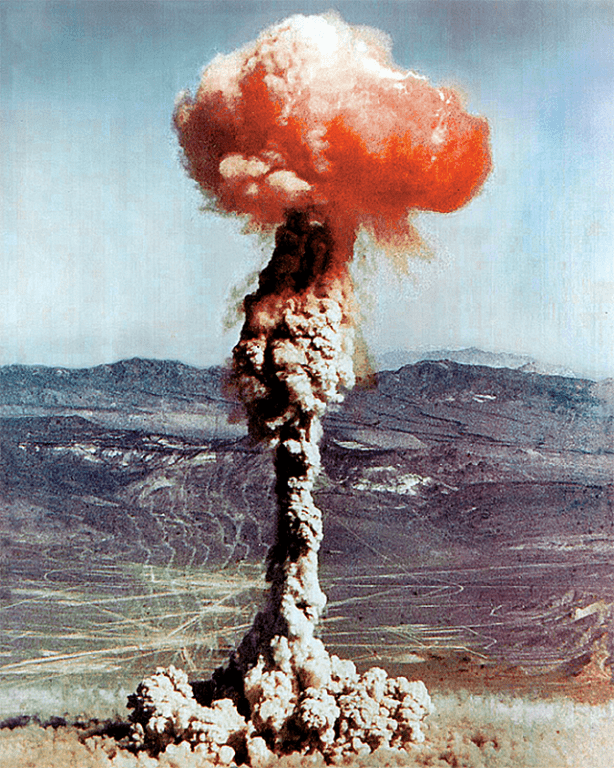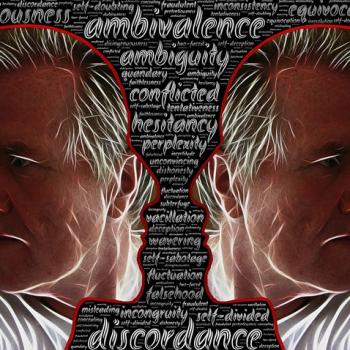
Bombings such as Hiroshima and Nagasaki are clearly covered in the conciliar prohibition.
***
I’ve been pondering this issue quite a bit. To me it seems obvious. Yet other perfectly orthodox Catholics, in good faith, and with concern for just war ethics, sincerely disagree.
Out of mainly intellectual curiosity, then, I wanted to take a look around the Internet and see if I could find any further material on this particular aspect of the ethical / military question. I want to do a more detailed analysis of the passage in question, somewhat similar to the way we might delve into a biblical passage to better ascertain its meaning and depth.
First of all, the basics: Gaudium et spes is the document from the Second Vatican Council (7 December 1965) known in English as the Pastoral Constitution on the Church in the Modern World. The main passage brought to bear on this issue, and disputed as to its exact meaning, is 80:3:
[T]he Council, endorsing the condemnations of total warfare issued by recent popes (3), declares: Every act of war directed to the indiscriminate destruction of whole cities or vast areas with their inhabitants is a crime against God and man, which merits firm and unequivocal condemnation.(Austin Flannery edition; Footnote 3: 3. Cf. Pius XII, Allocution, 30 Sept. 1954: AAS 46 [1954], p. 589; Christmas Message 1954; AAS 47 [1955], pp. 15 ff.; John XXIII, Litt. Encycl. Pacem in Terris: AAS 55 [1963], pp. 286-291; Paul VI, Address to the United Nations, 4 Oct. 1965: AAS 57 [1965], pp. 877-885)
The Walter M. Abbott version of the same passage follows:
. . . this most holy Synod makes its own the condemnations of total war already pronounced by recent popes (260), and issues the following declaration: Any act of war aimed indiscriminately at the destruction of entire cities or of extensive areas along with their population is a crime against God and man himself. It merits unequivocal and unhesitating condemnation.(the footnote 259 informs the reader that this passage “contains one of the few uses of the term “condemnation” in the record of Vatican II”)
I have also found a translation of the relevant portion from a speech from Pope Pius XII, which this statement cites as background:
Even then, however, one must strive to avoid it by all possible means through international understanding or to impose limits on its use that are so clear and rigorous that its effects remain restricted to the strict demands of defense. When, moreover, putting this method to use involves such an extension of the evil that it entirely escapes from the control of man, its use must be rejected as immoral. Here there would be no longer a question of “defense” against injustice or a necessary “safeguarding” of legitimate possessions, but the pure and simple annihilation of all human life within the radius of action. This is not permitted for any reason whatsoever.(source: Allocution {or} Address to the 8th Congress of the World Medical Association, 30 September 1954; cited in Gaudium et spes, at 80:3 as a background thought-source, and listed in Acta Apostolicae Sedis [AAS] 46 [1954], p. 589; cited in John J. Cardinal O’Connor, In Defense of Life [Daughters of St. Paul: 1981]. Part of this book was reprinted in The Apocalyptic Premise: Nuclear Arms Debated, edited by Ernest W. Lefever and E. Stephen Hunt, Washington, D.C.: Ethics & Public Policy Center, 1982, pp. 295-308; entitled “The Church’s Views on Nuclear Arms.”)
I have run across one extraordinary treatment of this subject, on a Catholic blog (part of St. Blog’s) called “153.” The author, Paul (unknown last name) has quite impressive academic credentials indeed:
The author has a doctorate in relativity and cosmology from Oxford, and has worked in nuclear technology, pre-PC personal computer design, telecommunications, statistical analysis, genetic algorithms, and game design.
Here [the rest of this post below] are his thought-provoking comments (from his blog post one / post two):
Total war
The blog Cor ad cor loquitor [old name for my blog] has posted a summary retrospective discussion into whether or not the bombings of Hiroshima and Nagasaki were morally permissible, and provided many viewpoints both new and old. Some of the comments go into the apparently endless military and strategic details which accompanied the close of WWII and are, I suppose, an engaging pastime. But the briskness with which relevant highly official Catholic teaching – a million times weightier than any individual’s view – is quickly blown aside, or not even engaged [i.e., by my opponents], is not so pleasing.
This teaching is, of course, from the teaching document Gaudium et Spes, where, in 1965, the worldwide Catholic Bishops, formally assembled under the guidance of the Pope, made this declaration:
Every act of war directed to the indiscriminate destruction of whole cities or vast areas with their inhabitants is a crime against God and humanity, which merits firm and unequivocal condemnation.
I do not think Bishops in Council make such trivial points; they had larger goals in mind. Their declaration would be a peculiar historical time to teach the obvious. And the Bishops clearly took care to highlight that particular declaration within the rest of the document, though filled with many other important matters.
So what are the Bishops saying? We can pick out some things:
What is condemned is an act. No moral reckoning is included for the reasons, motivations, or goals of the act however good or bad – the act is condemned regardless of those.
What is the act that is condemned? Clearly it is some kind of indiscriminate destruction. So then, we must determine what destruction is sometimes not permitted, and then exactly in what kind of indiscriminate way the destruction must never be carried out.
The what is easy to determine: the document declares that in some circumstances we cannot destroy “entire cities or extensive areas along with their population”.
More critical is to determine in what sense indiscriminate should be taken. Indiscriminate in what way? Here the Bishops have provided the necessary context in a closely preceding paragraph of their document:
The proliferation of scientific weapons has immeasurably magnified the horror and wickedness of war. Warfare conducted with such weapons can inflict immense and indiscriminate havoc which goes far beyond the bounds of legitimate defense. Indeed, if the kind of weapons now stocked in the arsenals of the great powers were to be employed to the fullest, the result would be the almost complete reciprocal slaughter of one side by the other, not to speak of the widespread devastation that would follow in the world and the deadly after-effects resulting from the use of such weapons.
The Bishops have their eye on the indiscriminate effects of the weapons. That is their sense for indiscriminate. (In the context of the sixties the weapons were nuclear, but they do not limit what they say to just those weapons; for technology moves ever onwards.) And the effects of nuclear weapons are indeed indiscriminate; a re-reading of the harrowing eyewitness account given by Father Siemes of the bombing of Hiroshima provides ample evidence of this. Soldiers, mothers, kintergarten children, farmers, priests, nuns, tram passengers, Japanese, Koreans, Germans, Protestant girls, peasants, professors, theology students: all victims alike.
Nuclear weapons have this effect because of the extensive area affected by the direct blast, and the even larger area, over an extended period of time, that will be affected by fallout. There are some very small nuclear weapons which, by careful design, probably do not have such extensive effects, and might be usable in a narrowly localizable and thus discriminate way. Presumably the Bishops are not addressing that case. But the Hiroshima-sized weapons are large enough that, when used against a populated city, they must affect population of large areas. That is the indiscriminate act that the Bishops condemn.
Subsequent to Gaudium et Spes, it is not possible to claim that, because a city or an area has a military target within it, it is moral to attack the population of the whole city, or the whole area, in order to destroy the military target. Such an indiscriminate act is condemned, regardless of the motive for it.
(And given the condemnation of such an act, any use of the double effect principle in order to support the Hiroshima and Nagasaki bombings is ruled out, since that principle can never be used where the action under consideration is already known to be morally wrong.)
Total war 2
A comment left on the blog Cacciaguida, and a reply relating to my posting just below here brought some follow-up that it will be useful to address . . . the commenter says:
By its terms this text focuses, as I argued we should, on what the act of war is “directed at,” and also by its terms, it does not condemn acts directed at the discriminate destruction of military sites where all possible precautions have been taken to minimize harm to “inhabitants” (assuming that “inhabitants” means what the law of war calls noncombatants).
The “directed to” in the Vatican II text is there in order to indicate that the condemnation does not apply to acts which may have the unplanned end-effect of destroying a city, and also to indicate that an unsuccessful act is still condemned.
The commenter makes the common enough guess at what sense “indiscriminate” is being used, and does not address the fact that the Bishops themselves indicate what they meant by “indiscriminate”, in their own preceding text. It was the indiscriminate effects of weapons that they had in mind. Two examples of this from the Vatican II text:
The horror and perversity of war is immensely magnified by the addition of scientific weapons. For acts of war involving these weapons can inflict massive and indiscriminate destruction
That text does not use “indiscriminate” to refer to the judicious selection of which city might be morally obliterated, but instead refers to the effects of the weapons used on a city — the magnified effect of the weapon means that it affects everything within the city, and not just any military target that might be there.
[Dave: which hearkens back to the language and thought of Pius XII on 30 September 1954, cited above]
Or again, in the preamble to the declaration:
With these truths in mind, this most holy synod makes its own the condemnations of total war already pronounced by recent Popes, and issues the following declaration.
The reference to “total war” (particularly with such a reference being used during the sixties) clearly refers to a war that affects the whole population, combatants and non-combatants alike.
The commenter makes another guess that “inhabitants” means non-combatants. Reading the relevant parts of Gaudium et Spes gives no support to such a guess, and again points in the direction that the Bishops had in mind the whole population of a city, combatants or not.
The commenter also says:
Double effect (rightly understood, i.e., not watered down to mere consequentialism) is an established tool of Catholic moral theory. A council that sought to change it, or a fortiori repeal it as applied to a given category of action, would have to do so clearly and dogmatically. The text you cite does not come close.
But I have never in the slightest way suggested (nor would I) that double effect could be done away with as whole. Nor has there ever been an official list defining all the possible actions which may be decided on by use of double effect. And specifically, even if there were such a hypothetical list, how could the use of nuclear weapons be placed on it prior to 1945? So, was it ever officially taught, in the short time between 1945 and 1965, that the use of nuclear weapons could be decided on legitimately by the use of double effect? I know of no such text. So how can there be a question of some kind of repeal? And as for defining an action clearly and dogmatically, I think a highlighted declaration by an Ecumenical Council qualifies eminently.
Double effect can be used to help decide on the morality of acts which have simultaneously good and bad consequences. But double effect cannot be used to decide on the morality of acts which are already known to be immoral. Catholic teaching (e.g. in the Catechism) already points to some acts which have be declared to be intrinsically immoral. The Bishops’ declaration in Gaudium et Spes describes an act which has that intrinsic nature – the act is condemned regardless of the motives or intentions behind it.
***
(originally 2-1-06)
Photo credit: 14 kiloton atomic explosion, October 30, 1951 at Yucca Flat, Nevada [public domain / Wikimedia Commons]
***













